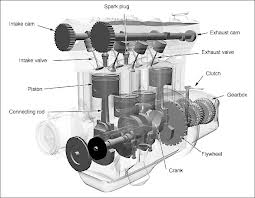Engines
Engine or motor is a machine designed to convert energy into useful mechanical motion.Heat engines, including internal combustion engines and external combustion engines such as steam engines burn a fuel to create heat, which then creates motion. Electric motors convert electrical energy into mechanical motion, pneumatic motors use compressed air and others—such as clockwork motors in wind-up toys—use elastic energy. In biological systems, molecular motors, like myosins in muscles, use chemical energy to create motion.
Terminology
Originally, an engine was a mechanical device that converted force into motion. Military devices such as catapults, trebuchets and battering rams are referred to as siege engines. The term gin as in cotton gin is recognised as a short form of the Old French word engin, in turn from the Latin ingenium, related to ingenious. Most devices in the industrial revolution were called engines, and this is where the steam engine gained its name.
In modern usage, the term describes devices capable of performing mechanical work, as in the original steam engine. In most cases, the work is produced by exerting a torque or linear force, which operates other machinery that generates electricity, pumps water, or compresses gas. In the context of propulsion systems, an air-breathing engine is one that uses atmospheric air to oxidise the fuel rather than supplying an independent oxidizer, as in a rocket.While colloquially interchanged, there is a difference between a motor and an engine. In common usage, an engine burns or otherwise consumes fuel, and is differentiated from an electric machine that derives power without changing the composition of matter.A heat engine may also serve as a prime mover, a component that transforms the flow or changes in pressure of a fluid into mechanical energy.An automobile powered by an internal combustion engine may make use of various motors and pumps, but ultimately all such devices derive their power from the engine. Another way of looking at it is that a motor receives power from an external source, and then converts it into mechanical energy, while an engine creates power from pressure ,derived directly from the explosive force of combustion or other chemical reaction, or secondarily from the action of some such force on other substances such as air, water, or steam.The term motor was originally used to distinguish the new internal combustion engine-powered vehicles from earlier vehicles powered by steam engines, such as the steam roller and motor roller, but may be used to refer to any engine.Devices converting heat energy into motion are commonly referred to simply as engines.
Environmental effects
The operation of engines typically has a negative impact upon air quality and ambient sound levels. There has been a growing emphasis on the pollution producing features of automotive power systems. This has created new interest in alternate power sources and internal-combustion engine refinements. Though a few limited-production battery-powered electric vehicles have appeared, they have not proved competitive owing to costs and operating characteristics.In the 21st century the diesel engine has been increasing in popularity with automobile owners. However, the gasoline engine, with its new emission-control devices to improve emission performance, has not yet been significantly challenged.

